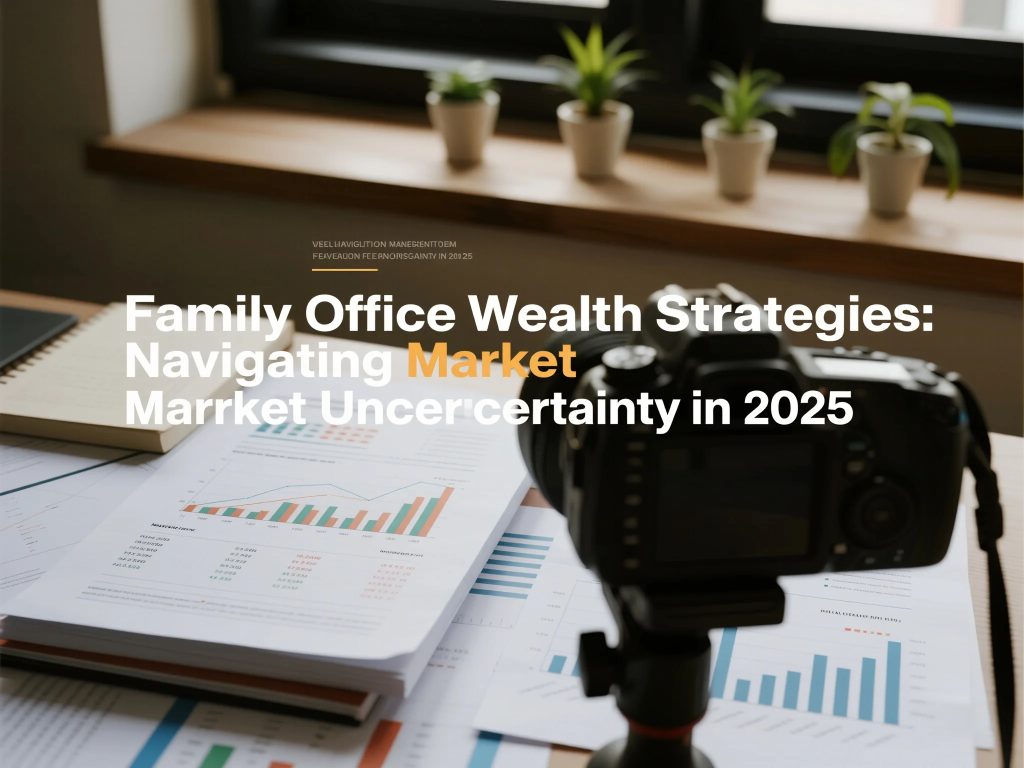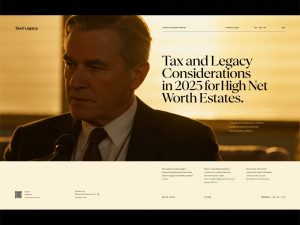Strategic Wealth Management in an Era of Economic Uncertainty Navigating the complex landscape of wealth preservation requires sophisticated family office wealth strategies that transcend traditional investment approaches. The current economic environment presents unprecedented challenges for ultra-high-net-worth families, with market volatility, geopolitical tensions, and regulatory changes creating a perfect storm
of uncertainty. However, these challenges also present unique opportunities for families who adopt proactive, forward-thinking approaches to wealth management. The most successful family offices recognize that effective wealth preservation extends far beyond simple asset allocation—it encompasses comprehensive risk management, intergenerational planning, and strategic positioning across multiple asset classes and jurisdictions. Understanding the interplay between various economic factors, market cycles, and family dynamics forms the foundation of successful wealth preservation in today’s rapidly evolving financial landscape. The most effective strategies combine traditional wealth preservation techniques with innovative approaches tailored to individual family circumstances, ensuring that each component of the financial picture works harmoniously toward long-term objectives while maintaining flexibility to adapt to changing market conditions.Comprehensive Multi-Family Office Solutions for Modern Wealth Management Sophisticated multi-family office solutions have emerged as powerful vehicles for addressing the complex needs of affluent families in an increasingly interconnected global economy. These collaborative structures offer significant advantages over traditional single-family offices, including enhanced economies of scale, access to
specialized expertise, and improved risk diversification capabilities. The evolution of multi-family offices reflects a fundamental shift in how wealthy families approach wealth management, moving from isolated decision-making to collaborative strategies that leverage collective intelligence and shared resources. These organizations provide comprehensive services that extend beyond investment management to include tax optimization, estate planning, philanthropic coordination, and family governance frameworks. The most effective multi-family offices develop deep understanding of each family’s unique values, goals, and risk tolerances, creating customized solutions that align with both financial objectives and personal aspirations. This holistic approach ensures that wealth management strategies remain responsive to changing family circumstances while maintaining consistency with long-term vision and legacy objectives.Advanced Hedge Fund Advisory Services for Sophisticated Investors
Professional hedge fund advisory USA services play a crucial role in the wealth management strategies of ultra-high-net-worth families seeking sophisticated investment opportunities. These advisory services provide access to exclusive hedge fund strategies that offer potential for enhanced returns, improved diversification, and reduced correlation with traditional asset classes. The most successful advisory relationships combine deep market knowledge with rigorous due diligence processes, ensuring that hedge fund investments align with overall portfolio objectives and risk parameters. Advisory teams typically conduct comprehensive analysis of fund managers’ track records, investment processes, risk management frameworks, and operational capabilities before making recommendations. This thorough approach helps families navigate the complex hedge fund landscape while avoiding common pitfalls associated with alternative investments. The advisory process also includes ongoing monitoring and performance evaluation, ensuring that hedge fund allocations continue to meet expectations and contribute positively to overall portfolio performance. Effective hedge fund advisory relationships provide families with access to institutional-quality investment opportunities while maintaining appropriate risk controls and alignment with long-term wealth preservation goals.
Sophisticated Discretionary Portfolio Management Approaches
Implementing effective discretionary portfolio management represents a cornerstone of modern wealth preservation strategies for families seeking professional oversight of their investment assets. This approach delegates day-to-day investment decisions to experienced portfolio managers while maintaining strategic alignment with family objectives through clearly defined investment guidelines and regular performance reviews. The discretionary management model offers several advantages over advisory relationships, including faster execution of investment decisions, more proactive risk management, and reduced administrative burden for family members. Portfolio managers typically develop comprehensive investment strategies that incorporate asset allocation, security selection, risk management, and performance monitoring within a unified framework. The most successful discretionary relationships establish clear communication protocols, regular reporting requirements, and well-defined performance benchmarks to ensure transparency and accountability. This approach allows families to benefit from professional investment expertise while maintaining appropriate oversight and control over their wealth management strategies. The discretionary model proves particularly valuable during periods of market volatility, when timely decision-making and professional expertise can significantly impact investment outcomes and wealth preservation objectives.
Strategic Allocation to Alternative Investments for Enhanced Returns
Strategic allocation to alternative investments for UHNW portfolios represents a critical component of comprehensive wealth management strategies designed to enhance returns, improve diversification, and reduce overall portfolio risk. Alternative investments encompass a wide range of asset classes beyond traditional stocks and bonds, including private equity, venture capital, real estate, hedge funds, commodities, and infrastructure investments. These investments typically exhibit lower correlation with public markets, providing valuable diversification benefits during periods of market stress or economic uncertainty. The most successful alternative investment programs combine thorough due diligence, careful manager selection, and appropriate sizing of allocations based on risk tolerance, liquidity needs, and investment horizon. Families typically work with experienced advisors to develop comprehensive alternative investment strategies that align with their overall wealth management objectives while maintaining appropriate risk controls and liquidity management. The due diligence process for alternative investments often includes detailed analysis of fund terms, fee structures, manager track records, and operational capabilities to ensure investments meet quality standards and performance expectations.

Risk Management Frameworks for Family Office Portfolios
Developing comprehensive risk management frameworks represents an essential component of effective wealth preservation strategies for family offices operating in today’s complex financial environment. These frameworks typically incorporate multiple layers of risk analysis, including market risk, credit risk, liquidity risk, operational risk, and geopolitical risk assessments. The most sophisticated risk management approaches utilize advanced quantitative models, scenario analysis, and stress testing to evaluate potential impacts of various market conditions on portfolio performance. Risk management frameworks also include clear risk tolerance guidelines, position limits, and hedging strategies designed to protect wealth during periods of market stress or economic uncertainty. Family offices typically establish regular risk reporting protocols that provide transparency into portfolio risks and enable informed decision-making about risk management strategies. The integration of environmental, social, and governance (ESG) considerations into risk management frameworks represents an emerging trend among forward-thinking family offices seeking to address sustainability risks and opportunities. Effective risk management requires ongoing monitoring and adjustment as market conditions evolve and new risks emerge, ensuring that wealth preservation strategies remain robust and responsive to changing circumstances.
Intergenerational Wealth Transfer and Succession Planning Strategies
Comprehensive intergenerational wealth transfer planning represents a critical aspect of long-term wealth preservation for family offices seeking to ensure smooth transitions between generations while minimizing tax implications and maintaining family harmony. These strategies typically involve sophisticated estate planning techniques, including trust structures, family limited partnerships, and various gifting strategies designed to transfer wealth efficiently while preserving family values and legacy objectives. The most successful succession planning approaches involve early engagement of younger family members in wealth management discussions, financial education programs, and gradual assumption of responsibilities to ensure smooth transitions when leadership changes occur. Family offices often develop detailed succession plans that address both business continuity and family governance considerations, ensuring that wealth management structures remain effective across multiple generations. These plans typically include clear documentation of family values, investment philosophies, and governance principles to guide future decision-making and maintain consistency with original wealth preservation objectives. The integration of philanthropic planning into succession strategies represents an important consideration for many families seeking to create lasting impact beyond financial wealth preservation.
Technology Integration and Digital Transformation in Family Offices
The integration of advanced technology solutions represents a transformative trend in modern family office operations, enabling enhanced efficiency, improved decision-making, and better risk management capabilities. Technology adoption typically includes implementation of sophisticated portfolio management systems, data analytics platforms, cybersecurity measures, and digital communication tools designed to streamline operations and enhance service delivery. The most forward-thinking family offices leverage artificial intelligence and machine learning technologies to enhance investment research, risk analysis, and portfolio optimization capabilities. Digital transformation initiatives also include development of secure client portals that provide real-time access to portfolio information, performance reporting, and document management capabilities. Cybersecurity represents a critical consideration in technology adoption, with family offices implementing robust security measures to protect sensitive financial information and prevent unauthorized access to systems and data. The integration of blockchain technology and digital assets represents an emerging trend among innovative family offices seeking exposure to new investment opportunities and enhanced operational efficiency. Technology adoption requires careful planning, appropriate resource allocation, and ongoing training to ensure successful implementation and maximum benefit from digital transformation initiatives.
Philanthropic Strategy Integration and Impact Investing Approaches
Strategic integration of philanthropic planning and impact investing represents an increasingly important component of comprehensive wealth management strategies for family offices seeking to align financial objectives with social and environmental values. Philanthropic strategies typically include establishment of family foundations, donor-advised funds, and various charitable giving vehicles designed to maximize tax efficiency and social impact. The most effective philanthropic approaches involve careful alignment of giving strategies with family values, thorough due diligence on recipient organizations, and systematic evaluation of philanthropic outcomes and impact. Impact investing represents a natural extension of philanthropic strategies, allowing families to deploy capital toward investments that generate both financial returns and positive social or environmental outcomes. These investments typically span various asset classes, including private equity, venture capital, real estate, and fixed income, with specific focus on addressing social or environmental challenges. The integration of environmental, social, and governance (ESG) considerations into investment decision-making represents another important aspect of values-based investing for family offices seeking to align portfolios with sustainability principles. Effective philanthropic and impact investing strategies require careful measurement and reporting of both financial performance and social/environmental outcomes to ensure alignment with stated objectives and continuous improvement of impact measurement methodologies.
Global Investment Strategies and Cross-Border Wealth Management
Developing comprehensive global investment strategies represents an essential consideration for family offices operating in today’s interconnected financial markets, where opportunities and risks transcend national borders. These strategies typically involve careful analysis of various geographic regions, currency considerations, regulatory environments, and political risks to optimize portfolio diversification and enhance risk-adjusted returns. The most successful global investment approaches combine thorough country analysis, currency hedging strategies, and careful selection of local investment partners to navigate complex international markets effectively. Cross-border wealth management requires sophisticated understanding of various tax treaties, regulatory requirements, and compliance obligations across multiple jurisdictions to ensure proper structuring of international investments and efficient management of global wealth. Family offices typically work with experienced legal and tax advisors to develop appropriate structures for holding international assets, managing currency exposures, and optimizing tax efficiency across different jurisdictions. The integration of emerging market opportunities into global investment strategies represents an important consideration for families seeking enhanced growth potential and diversification benefits, though these investments require careful risk assessment and appropriate sizing within overall portfolios. Effective global wealth management requires ongoing monitoring of international developments, regulatory changes, and geopolitical risks to ensure strategies remain responsive to changing market conditions and continue to align with long-term wealth preservation objectives.




